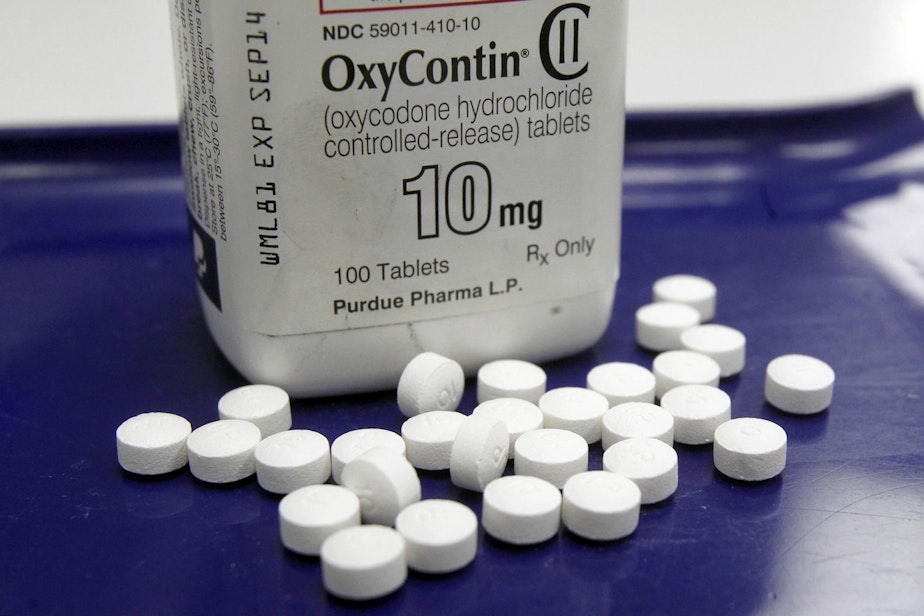Purdue Pharma, Sackler Family Face Lawsuits For Fueling Opioid Crisis

Editor’s Note: This hour discusses topics of drug addiction that some listeners may find disturbing or offensive.
If you or anyone you know is living with addiction and depression, there are resources available for help. Visit the Substance Abuse and Mental Health Services Administration’s website or call the helpline at 1-800-662-HELP (4357).
With Meghna Chakrabarti
Massachusetts is suing Purdue Pharma, the maker of the painkiller OxyContin, and the family who profited from it for fueling the opioid crisis.
Read the complete, unredacted complaint filed by Massachusetts attorney general Maura Healey against Purdue Pharma and the Sackler familyRead Purdue Pharma’s statement in response to the lawsuitGuests
Christine Willmsen, senior investigative editor-reporter for WBUR. (@christinesea)
Barry Meier, former New York Times reporter who’s covered Purdue Pharma and the Sackler family since 2001. Author of “Pain Killer: An Empire of Deceit and the Origin of America’s Opioid Epidemic.” (@BarryMeier)
Maura Healey, Massachusetts Attorney General. The state has filed a lawsuit against Purdue Pharma and the Sackler family for allegedly spreading and promoting the unsafe use of opioids. (@MassAGO)
From The Reading List
WBUR: “Suit: Patients Who Used Purdue’s Discount Cards Were More Likely To Get Hooked On OxyContin” — “Unsuspecting patients on the painkiller OxyContin didn’t know their chances of becoming addicted increased significantly when they used the drugmaker’s prescription discount card.
“Purdue Pharma created the OxyContin Savings Card so people would stay on the drug for longer periods of time, which resulted in higher rates of addiction and more overdoses, claims the Massachusetts attorney general’s office in a recent lawsuit against the company and the Sacklers, the family behind it.
“Many pharmaceutical companies provide a savings or discount card for expensive name-brand or high-volume drugs. Internal Purdue documents reveal that people on savings cards remained on OxyContin longer and produced especially ‘high returns’ for the Sacklers, the suit alleges.”
New York Times: “Sackler Scion’s Email Reveals Push for High-Dose OxyContin, New Lawsuit Disclosures Claim” — “A member of the Sackler family that owns OxyContin’s maker directed the company to put a premium on selling high dosages of its potentially addicting painkillers, according to new disclosures in a lawsuit.
“Richard Sackler, a son of a founder of Purdue Pharma and its onetime president, told company officials in 2008 to ‘measure our performance by Rx’s by strength, giving higher measures to higher strengths,’ according to an email written by Mr. Sackler, contained in the filing.
“The lawsuit, which was filed in June by the Massachusetts attorney general, Maura Healey, claims that Purdue Pharma and members of the Sackler family knew that putting patients on high dosages of OxyContin for long periods increased the risks of serious side effects, including addiction. Nonetheless, they promoted higher dosages because stronger pain pills brought the company and the Sacklers the most profit, the lawsuit has charged.”
Wall Street Journal: “Purdue Pharma Family Had Heavy Hand in Opioid Marketing, Complaint Says” — “In early 2011, Purdue Pharma was gearing up to promote its newest opioid painkiller, Butrans. Richard Sackler, a board member, former president and second-generation member of the company’s controlling family, made his high expectations for sales clear.
“‘I had hoped for better results,’ he emailed sales staff after hearing about a week of prescriptions that doubled Purdue forecasts, new court documents show. ‘What else more can we do to energize the sales and grow at a faster rate?’ he said after reviewing another weekly report, according to the documents.
“The internal emails emerged Tuesday in an amended complaint filed by Massachusetts Attorney General Maura Healey, who sued Purdue, eight Sackler family members and other board members and executives in June for allegedly contributing to the state’s opioid epidemic through its aggressive marketing of opioids. Massachusetts is one of at least 36 states to sue Purdue, along with more than 1,500 cities and counties, accusing the company of helping create a public health crisis that kills more than 100 Americans daily.”
Brian Hardzinski produced this hour for broadcast. [Copyright 2019 NPR]
